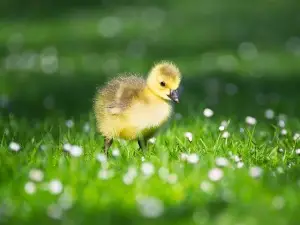
Leg problems aren’t that uncommon in ducklings, these little birds are still young and a variety of factors can cause them to suddenly develop issues with their legs, issues including being bow-legged.
A duckling being bow-legged is not normal or natural, and it can lead to a variety of issues in the future, this article explores why this happens and what to do about it.
Table of Contents
Bow-legged duckling:
Keeping an eye on your ducklings, and their health, is imperative if you want these birds to grow into adult ducklings, these birds are very fragile during the early stages of life and almost any change can be cause for alarm.
If your duckling is bow-legged then the bird may be suffering from a niacin deficiency:
What is niacin?
Ducklings need a variety of different vitamins and minerals to maintain good health, one of the vitamins that ducklings need to maintain good health is vitamin B3, or, niacin.
Niacin supports good development and growth of ducklings. Different types of birds need this in different amounts, ducklings need about two to three times more niacin than chicks do.
Birds need to be fed niacin on a regular basis. Because niacin is water soluble the bird’s body removes excess niacin in the bird’s body on a regular basis. Niacin is removed by the bird’s body in its waste when the body has too much of it.
The body will however need to be fed more niacin after removing the excess niacin so that the bird doesn’t become deficient in this nutrient.
Signs of niacin deficiency in ducklings:
The bird’s waterfowl feed should contain all the niacin that growing ducklings need but some ducklings will simply need more niacin than others to maintain strong bones.
If your bird hasn’t been getting enough niacin, if the bird has been eating chick feed that contains too little niacin, or if the bird has been eating waterfowl feed but needs more niacin than the other birds do, then the bird will be niacin deficient.
Signs of a niacin deficiency in ducks include the bird being bow-legged, enlarged hock joints, trying to use its wings to stay up, weakness, being reluctant to walk, laying down often, inward pointed feet, and stunted growth.
If left untreated, the birds will eventually become crippled and won’t be able to walk anymore. If the bird can’t eat, and you aren’t there to help the bird eat, then the bird will die.
What to do:
Treating the bird as soon as you realize that it has a niacin deficiency is a must.
If you let the bird go untreated for a long time, then the bird’s bones will permanently maintain that bow-legged position, and you won’t be able to treat the bird no matter what you do.
If you’re feeding your ducklings a non-medicated chick feed, then you can continue to feed this feed to your birds but you would need to supplement niacin into the bird’s diet.
You can add human niacin supplements to the bird’s diet to help with this deficiency. Doing this is as easy as pulling open the supplement capsules and pouring the contents into the bird’s water.
Make sure that the birds drink this water and don’t spill it.
You can also add the contents of the supplement into the bird’s treats and offer this to the bird if the bird doesn’t like the taste of the water and supplement combination.
If the bird has trouble taking the supplements in the ways suggested above, or if the bird’s condition is bad, then you can feed the contents of the supplements directly into the bird’s mouth using a syringe.
Feeding the bird niacin supplements made for cattle is also recommended.
If you can find a specialty waterfowl feed then give this to your bird. If some of your birds still need the added niacin in their diet after being given this specialty feed then supplement niacin in the bird’s diet
Niacin-rich foods:
Giving the bird niacin-rich foods is also recommended. The combination of niacin-rich feed, niacin supplements, and niacin-rich treats is a good way to make sure that the birds don’t suffer from a niacin deficiency.
Foods that are rich in niacin include tuna fish, peas, pumpkin, sweet potatoes, nutritional yeast, sardines, salmon, and feeder fish.
You don’t have to worry about the birds overdosing on niacin as it is water-soluble. The bird’s body will remove the excess niacin with the bird’s waste.
If the bird does overdose on niacin then the bird will start to have digestive issues, but a duckling overdosing on niacin is very unlikely.
Just be sure that you offer the bird a well-rounded diet to lessen the chances of the bird overdosing on niacin.
If you enjoyed this article then you may also be interested in other chicken related articles. Here are some articles that you may be interested in: Pigeon-Toed Duck, Beak Rot In Ducks, Callus On Duck’s Foot, Black Spots On Duck Bill, Black Spot On Duck Foot

